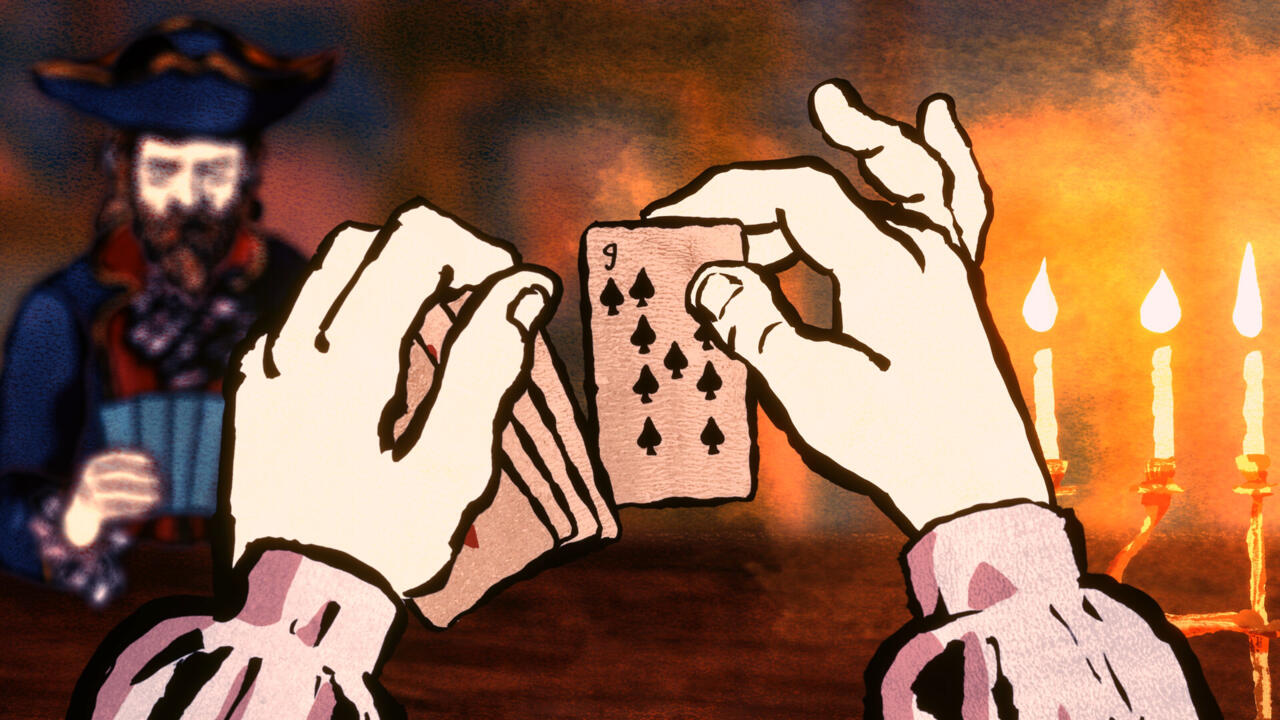Best Of 2022: Card Shark’s Take On Historical Gender Is Both Playful And Enlightening
There is a woman at this party. Slight and dainty, she’s the niece of a posh lord. She hides her jawline beneath a fan, smiles with glittering power as she is invited to the card table. Her hands are always bad and her grasp of the rules seems tenuous. Forgetting her knife-sharp grin, you settle into a wine-fuelled haze. Only when the night is over do you count your coins, realize how much you’ve lost, and think again of that shining smile.
In its broad survey of French aristocracy, Card Shark allows players to explore crossdressing and queerness. The game’s tangible relationship to history is playful, broad, and particular (as I’ve written about before). Card Shark freely borrows tricksters and cheats from throughout history but also shows off the unique class-bridging function of card playing in the specific time period. Card Shark’s France is broiling with class friction, as a rising bourgeoisie has increasing power but is also isolated from the immense wealth of the ruling aristocracy. Underneath it all, Romani caravans avoid persecution and the revolution brews. Player character Eugene and his mentor, the Comte de Saint Germain, will explore all this through cheating at the aforementioned card games, amassing wealth, and discovering a mystery at the heart of the French monarchy. While the story told is largely fiction, a combination of The Three Musketeers and a satirical comedy of manners, the social circumstances of the characters are grounded in a material history. That extends to Card Shark’s depiction of crossdressing, gender nonconformity, and transness.
Before we dig into Card Shark’s relationship to gender, I want to start on a brief note on pronouns and how to discuss the potential tranness of historical figures. I am going to use he/him pronouns and the name Eugene for Card Shark’s protagonist. This is, in no way, meant to undermine the potential to understand him as queer. It is tempting and not always incorrect to label historical figures as gay or lesbian or trans. However, it should be emphasized that these are relatively modern labels that are unevenly and sometimes unfairly layered over an infinite variety of individuals and identities. These labels are not untarnished truths that we can now use to interpret history purely. Rather they broadly identify experiences and social norms, against which people of all kinds judge and understand themselves. I particularly like the phrasing of Kit Heyam’s recent history of gender’s title: “Before We Were Trans.” The implication is that past gender-non-confirming people share a common heritage, and many identities, with current trans people, but that the particular label of “trans” is relatively new.
This does not mean Eugene’s performance of gender is insincere. In the game’s brief, but expressive, moments of choice, Eugene can express enthusiasm or weariness, readiness or forgetfulness to the act of crossdressing. Similarly, Eugene is a name given by the Comte, one that Eugene can ultimately accept or reject. These are scant moments of expressivity, but they are enough to leave tantalizing gaps in what might seem a mere male protagonist. The player can embrace Eugene’s femininity or leave it as a tool.
For the time being, though, Eugene cannot live simply “as a woman.” Still caught up, as he is, in the drama of the plot. The game focuses on this narrow period of his life. Though we see him as an elder after the French Revolution in the game’s denouement, much of Eugene’s future life is left to imagination. Eugene is the exact kind of figure who would have been forgotten by history–whose queerness might be left in the memory of scant parties where a forgotten woman briefly lived.
But that’s the thing: Most of us will also be forgotten. Many trans people are misrepresented upon their death or died before they could discover themselves. Card Shark understands gender as fluid, culturally and socially dependent, yet still chosen or embraced. It raises up and highlights a marginalized past, but it also lets players participate in it and in small ways define it for themselves. Because of its sharp and playful relationship with the past, it opens the door for players to understand themselves as part of a vast expanse of queer history.
The products discussed here were independently chosen by our editors.
GameSpot may get a share of the revenue if you buy anything featured on our site.
